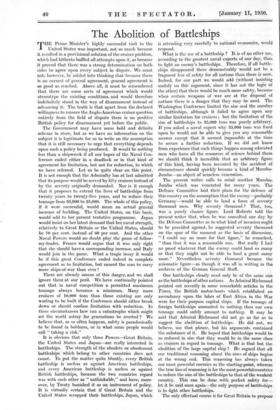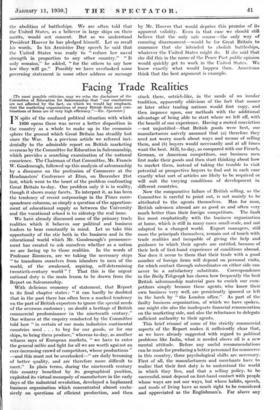The Abolition of Battleships
111HE Prime Minister's highly successful visit to the United States was important, not so much because it resulted in a proirisional solution of the cruiser problem, which had hitherto baffled all attempts upon it, as because it proved that there was a strong determination on both sides to agree upon every subject in dispute. We must not, however, be misled into thinking that because there is an earnest of general agreement, general agreement is as good as reached. Above all, it must be remembered that there are some sorts of agreement which would stereotype the existing conditions, and would therefore indefinitely stand in the way of disarmament instead of advancing it. The truth is that apart from the declared willingness to remove the Anglo-American cruiser question entirely from the field of dispute there is no positive British policy for disarmament yet before the public. - The Government may have some bold and definite scheme in store, but as we have no information on the subject it is legitimate for us to' write on the assumption that it is still necessary to urge that everything depends upon such a policy being produced. It would be nothing less than a shipwreck if all our hopes of the Naval Con- ference ended either in a deadlock or in that kind Of agreement for limitation, but not for reduction, to which we have referred. Let us be quite clear on this point. It is not enough that the Admiralty has at last admitted that its purpose would be served by fifty cruisers instead of by the seventy originally denhanded. Nor is it enough that it proposes to extend the lives of battleships from twenty years to twenty-five years, and to reduce their tonnage from 85,000 to 25,000. The whole of this policy, if it were successful, would mean an actual general increase of building. The United States, on this basiS, would add to her present tentative programme. Japan would insist on her latest demand that her naval strength, relatively to Great Britain or the United States, should be 70 per cent. instead of 60 per cent. And the other Naval Powers would no doubt play the game of follow- my-leader. France would argue that it was only right that she should have a corresponding increase, and Italy would join in the game. What a tragic irony it would be if this great Conference ended indeed in complete agreement as to limitation, but caused the seas to carry more ships-of-war than ever !
There are already omens of this danger, and we shall ignore them at our peril. We have continually pointed out that in naval competition a permitted maximum tonnage always becomes a minimum. Many more cruisers of 1.0,000 tons than those existing are only waiting to be built if the Conference should either break down or should confuse limitation with reduction. In these circumstances how can a catastrophe which might set the world astray for generations be averted ? We believe that, as so often happens, safety is paradoxically to be found in boldness, or in what some people would call " taking a risk."
It is obvious that only three Powers—Great Britain, the United States and Japan—are really interested in battleships. The strength of the obsolete or obsolescent battleships which belong to other countries does not count. To put the matter quite bluntly, every British battleship is useless as against American battleships, and every American battleship is useless as against British battleships, because the two countries regard war with each other as " unthinkable," and have, more- over, by Treaty banished it as an instrument of policY. It is virtually certain that if Great Britain and the United States scrapped their battleships, Japan, which is attending very carefully to national economies, would respond. What is the use of a battleship ? It is of no other use, according to the greatest naval experts of our day, than to fight an enemy's battleships. Therefore, if all battle- ships disappeared there demonstrably would not be a fragment less of safety for all nations than there is -now. Indeed, for our part we would add (without insisting unduly on this argument, since it has not the logic of the other) that there would be much more safety, because when certain weapons of war are at the disposal of nations there is a danger that they may be used. The Washington Conference limited the size and the number of battleships, although it failed to agree upon any similar limitation for cruisers ; but the limitation of the size of battleships to 35,000 tons was purely arbitrary. If you asked a naval expert why 35,000 tons was fixed upon he would not be able to give you any reasonable answer except that it seemed impossible at the time to secure a further reduction. If we did not know from experience that such things happen among educated men who have all the resources of science behind them we should think it incredible that an arbitrary figure of this kind, having been invented by the accident of circumstance should quickly become a kind of Mumbo- Jumbo—an object of senseless veneration.
The present writer calls to mind another Mumbej. Jumbo which was venerated for many years. The Defence Committee laid their plans for the defence of this country on the assumption that the enemy—probably. Gerinany—would be able to land a force of seventy thousand men. Why seventy thousand ? That, too, was a purely chance figure. Lord Roberts told the present writer that, when he was consulted: one day by the Defence Committee as to what kind of invasion ought to be provided against, he suggested seventy thousand on the spur of the moment as the basis of discussion. " I could say no more for that figure," he remarked, " than that it was a reasonable one. But really I had no proof whatever that the enemy could land so many or that they might not be able to land a great many more." Nevertheless - seventy thousand became the axiomatic figure—as though it was all in writing in the archives of the German General Staff. • Our battleships clearly need only be of the same size as the battleships of other nations. As Admiral Richmond pointed out recently in. some remarkable articles in the Times, the British motor-boats which established an ascendancy upon the lakes of East Africa in the Wax were for their purpose capital ships.. If the tonnage of foreign battleships amounted to nothing, then our own tonnage could safely amount to nothing.. It may be said that Admiral 'Richmond did not go so far as to suggest the abolition of battleships. He did not, we believe, use that phrase, but his arguments contained the substance_ of it. He hoped that battleships would be so reduced in size that they would, be in the same class as cruisers in regard to tonnage.. What is that but the abolition of the large capital ship ? He argued that all our traditional reasoning about the sizes of ships begins at the wrong end. This reasoning has always taken our most powerful enemies as the starting-point, whereas the true line of reasoning is for the most powerful countries to reduce the size of the battleships to that of the weakest country. This can be done with perfect safety for— let it be said once again—the only purpose of battleships is to fight other battleships.
The only effectual course is for Great Britain to propose the abolition of battleships. We are often told that the United States, as a believer in large ships on their merits, would not consent. But as we understand President Hoover he has pledged himself. Let us recall his words. In his Armistice Day speech he said that the United States was ready to " reduce her naval strength in proportion to any other country." " It only remains," he added, " for the others to say how low they will go." Possibly we have overlooked some governing statement in some other address or message by Mr. Hoover that would deprive this promise of its apparent validity. Even in that case we should still believe that the only safe course—the only way of ensuring disarmament—would be for Great Britain to announce that she intended to abolish battleships, whatever the United States might do. If she said that she did this in the name of the Peace Pact public opinion would quickly get to work in the United States. We know exactly what would happen then. Americans think that the best argument is example.







































 Previous page
Previous page